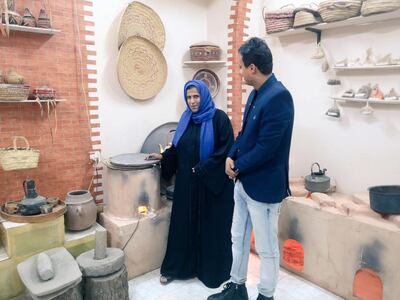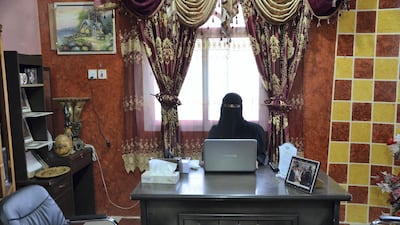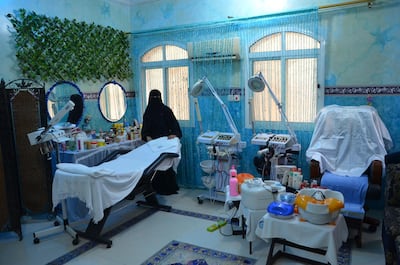In the early 1980s, Fatehia Al Dhaybani sold tropical fruits, such as doum and guava, in the city of Mukalla in Yemen's southeastern province of Hadramout. She dropped out of school early and selling fruit was her main source of income, as her father, who married her mother later in life, was ageing and emaciated. "I was very poor," she tells The National.
But today Al Dhaybani is one of the most successful businesswomen in the province, managing a company worth millions of Yemeni rials, while overcoming her father's death, extreme poverty and war. She owns Afrena Al Dhaybani, through which she and her team do brides' make-up before their weddings, as well as import beauty machines and products. We meet at the company's headquarters, a four-storey building coated in marble in Mukalla. "Life has never been easy, but my business is booming, thank God," she says.
The turning point in Al Dhaybani's life came when a childhood friend told her about an embroidery training course shortly after she left school. "I told her I couldn't afford the fees. She told me her father would pay it," Al Dhaybani says.
That didn't last long, however, and after only two months she was forced to leave the course because her friend stopped going. But Al Dhaybani didn't let that deter her from putting what she had already learnt to good use. "At home, I began practising embroidery and turned the skills into a business," she explains. "I sewed clothes and sold them. When I could not cope with the growing demand for my sewing, I hired women to help me."
Al Dhaybani says she soon decided to expand her burgeoning empire. She bought a piece of land and built a house, moving her business into her home so she could be close to her parents. Later, she bought another piece of land, where her offices now sit. It was around then that she chose to abandon embroidery and embraced the beauty industry instead. That proved to be a smart move, because her company has since gone from strength to strength.
In 2016, a year after the Yemen Civil War began, UAE-backed forces drove militants out of Mukalla, with the city consequently attracting thousands of people who fled fighting in their hometowns. Amid all this, Al Dhaybani's business has flourished. "Life here would be better if there were good roads, cleaner streets and no power cuts," she says. "We do not want anything more than this ... But I am happy with my life".
Dr Fawzia Nasher, head of the Yemeni Businesswomen Council, which was set up in 2007, says women like Al Dhaybani are increasingly rare in the country. Nasher says many Yemeni businesswomen have been forced to shut down their companies as a result of the conflict or have even fled. "Most have relocated their projects to Malaysia, Dubai, Turkey, Jordan, Egypt or Pakistan," Nasher adds.
But this hasn't stopped Najella Shamasan from pursuing her business ambitions in the southern city of Aden. A serial entrepreneur, she is also the head of the provincial branch of the Yemeni Businesswomen Council and a human rights activist.

Shamasan launched her first start-up in 1979, when she opened a workshop for welding and soldering, where workers made windows and fixed damaged tankers. As her business grew, she says she offered her services to the government's Yemen Oil Company. She also opened a sewing centre in Sanaa that specialised in making military uniforms.
When the 1994 civil war began, Shamasan returned to Aden, where she traded in scraps from heavy vehicles and started collecting used oil from garages and petrol stations, selling them to a local company that recycled and exported it all.
"As I was fond of heritage and art, I also built a nice museum in Aden, where traditional fashionable clothes, accessories and traditional households are displayed," she says. Some of those items were also put on sale in local hotels.
In 2015, however, the Iran-backed Houthi rebels stormed Aden and Shamasan's thriving businesses were destroyed. "I lost everything in the war," she says. "I am slowly trying to revive my work." So far, Shamasan says she has rebuilt her museum, turning it into a place for foreign dignitaries to visit. "I neither give up nor stay jobless," she adds determinedly.


